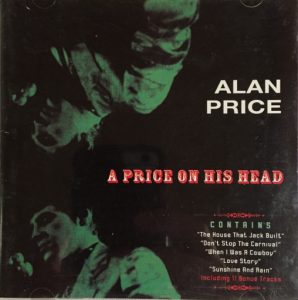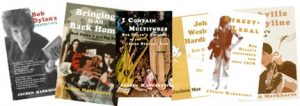Mississippi, Desolation Row, Crossing The Rubicon, Where Are You Tonight, Tombstone Blues… Some songs are so rich and multicoloured that they deserve their own book . I fear that almost every song on Rough And Rowdy Ways is going to claim that right.
The book of this series of articles is now available.
by Jochen Markhorst
XIV I’ll huff, and I’ll puff, and I’ll blow your house in
Greedy old wolf - I’ll show you my heart
But not all of it - only the hateful part
I’ll sell you down the river - I’ll put a price on your head
What more can I tell ya -
I sleep with life and death in the same bed
 Towards the end of the song, another “you” suddenly drops out of the blue. Classifying it as a stylistic feature goes a bit far, but still: Dylan has been doing this with some regularity since the 1960s. In both “Tombstone Blues” and “Desolation Row”, a “you” is only introduced in the very last verse; in “Changing Of The Guards”, a single utterly isolated “you” pops up halfway through the song, never to return; in “I And I”, it even lasts until the very last line (I’ve made shoes for everyone, even you, while I still go barefoot); “Lonesome Day Blues”, “Rollin’ and Tumblin'”, “I Am a Lonesome Hobo”… in every decade of Dylan’s career we encounter songs with this peculiar and often confusing artifice.
Towards the end of the song, another “you” suddenly drops out of the blue. Classifying it as a stylistic feature goes a bit far, but still: Dylan has been doing this with some regularity since the 1960s. In both “Tombstone Blues” and “Desolation Row”, a “you” is only introduced in the very last verse; in “Changing Of The Guards”, a single utterly isolated “you” pops up halfway through the song, never to return; in “I And I”, it even lasts until the very last line (I’ve made shoes for everyone, even you, while I still go barefoot); “Lonesome Day Blues”, “Rollin’ and Tumblin'”, “I Am a Lonesome Hobo”… in every decade of Dylan’s career we encounter songs with this peculiar and often confusing artifice.
Something similar applies to the equally confusing variant we are now confronted with here in this second and final bridge of “I Contain Multitudes”: an entirely different “you” pops up. We have already been introduced to a “you” in the opening couplet (I’ll lose my mind if you don’t come with me), which, at least on an emotional level, seems to be the same “you” as the only other “you”, the “you” from the third verse (Half my soul baby belongs to you): an object of love.
This “you”, on the other hand, is not a love object but, quite on the contrary a hate object, and is of a different gender (wolf as a term of abuse suggests that a man is being scolded here). At first glance, the antipathy does not seem to be that bad. “Old wolf”, greedy or not, is hardly offensive after all – it is rather an affectionate invective, something like “you scoundrel” or “naughty boy”. It is even somewhat childish – so in the song canon, we hardly ever encounter it either. In Dylan’s record collection, at most “The Girls I Never Kissed” by Sinatra can be found (on The Complete Reprise Studio Recordings or on Live From Las Vegas), and presumably Dylan did sing along with the opening couplet at some point;
The old wolf sniffs the summer breeze, and dreams about his youth,
For the sight of skirts above the knees turns his
hardboiled brain to tears.
And the scent of honey in the tree whets an old sweet tooth
… the opening couplet of the skillful ballad, written on request especially for the then 70-year-old Sinatra by the legendary success duo Leiber/Stoller, in 1986. Which explains the uncomfortable dirty ol’ man vibe of the slightly awkward, somewhat creepy lyrics (The pretty girls go strolling by / I smile at them, and heave a sigh).
Anyway: not too threatening, this old wolf. And the most threatening greedy old wolf in Western culture, the wolf in The Story Of The Three Little Pigs, isn’t much scarier either; after all, in almost all versions of that age-old children’s story, the wolf, while greedy, is also too stupid to catch three piglets. Still, it does seem to have been intended as an aggressive threat, as is clear from the sinister, wondrous continuation I’ll show you my heart, but not all of it – only the hateful part. And more so from the spiteful, archaic bouncer I’ll sell you down the river – I’ll put a price on your head.
It is, after the Lincoln reference from the previous stanza, the second time we see a fascination with the nineteenth century creeping in. “I’ll sell you down the river” is well defined in all dictionaries as To betray one for a personal benefit, and most dictionaries also reveal its origin: “dating from the mid-1800s, alludes to slaves being sold down the Mississippi River”. Where the dreaded cotton plantations are, where slaves literally work themselves to death. Dylan must also be familiar with it in this literal sense. Either from his self-study of nineteenth-century history or from the literary canon; in both Harriet Beecher Stowe’s classic Uncle Tom’s Cabin and Mark Twain’s oeuvre, we encounter this literal use of selling down the river. As in Twain’s hit Pudd’nhead Wilson (1894):
And now he added these words of awful import:
“I give you one minute.” He took out his watch. “If at the end of that time, you have not confessed, I will not only sell all four of you, BUT—I will sell you DOWN THE RIVER!”
It was equivalent to condemning them to hell! No Missouri Negro doubted this. Roxy reeled in her tracks, and the color vanished out of her face; the others dropped to their knees as if they had been shot; tears gushed from their eyes, their supplicating hands went up, and three answers came in the one instant.
(Chapter 2 – Driscoll Spares His Slaves)
They stumble over their words in their haste to confess what their marster wants to hear, who then graciously passes his judgement: “I will sell you here though you don’t deserve it. You ought to be sold down the river” – to the unspeakable relief of the poor slaves, who sob while thanking him for so much kindness. “They were sincere, for like a god he had stretched forth his mighty hand and closed the gates of hell against them.” A bizarre scene told in Twain’s typical, superior blend of humour, satire and cutting criticism – it leaves no reader unmoved, and the introduction to the bizarre, alienating threat I’ll sell you down the river is unforgettable. The subsequent threat in Dylan’s song, I’ll put a price on your head, would be a rather small associative leap then; after all, a selling price is quite literally stuck on the slave who has fallen into disgrace and is sold to the cotton plantation.
A bit weird, but still traceable, all in all. Although it might be more appealing to think that Dylan is saluting an old mate, English Rock ‘n’ Roll Hall Of Famer, Alan Price. We saw the old keyboardist of The Animals horsing around with Dylan in Dont Look Back (1967), and Price’s beautiful 1967 second album A Price On His Head stands the test of time – because it contains, apart from a whole slew of strong covers of Randy Newman songs (who was then still completely unknown), also one of the very finest “To Ramona” covers, and one of the finest Dylan covers at all.
Admittedly not very likely, Price’s album title being one of Dylan’s multitudes, but on the other hand: we heard Dylan sing The flowers are dying like all things do a few minutes ago, here in the opening stanza of “I Contain Multitudes”, as we hear Alan Price sing in the opening stanza of Dylan’s “To Ramona”:
The flowers of the city Though breathlike Get deathlike at times And there’s no use in tryin’ T’ deal with the dyin’ Though I cannot explain that in lines
“All these songs are connected. Don’t be fooled,” as Dylan says in his MusiCares speech in 2015, “it’s just different, saying the same thing.”
To be continued. Next up I Contain Multitudes part 15: The aim of all life is death
——-
Jochen is a regular reviewer of Dylan’s work on Untold. His books, in English, Dutch and German, are available via Amazon both in paperback and on Kindle:
- Blood on the Tracks: Dylan’s Masterpiece in Blue
- Blonde On Blonde: Bob Dylan’s mercurial masterpiece
- Where Are You Tonight? Bob Dylan’s hushed-up classic from 1978
- Desolation Row: Bob Dylan’s poetic letter from 1965
- Basement Tapes: Bob Dylan’s Summer of 1967
- Mississippi: Bob Dylan’s midlife masterpiece
- Bob Dylan’s Greatest Hits
- John Wesley Harding: Bob Dylan meets Kafka in Nashville
- Tombstone Blues b/w Jet Pilot: Dylan’s lookin’ for the fuse
- Street-Legal: Bob Dylan’s unpolished gem from 1978
- Bringing It All Back Home: Bob Dylan’s 2nd Big Bang
- Time Out Of Mind: The Rising of an Old Master
- Crossing The Rubicon: Dylan’s latter-day classic
- Nashville Skyline: Bob Dylan’s other type of music
- Nick Drake’s River Man: A very British Masterpiece
- I contain Multitudes: Bob Dylan’s Account of the Long Strange Trip


Homer’s
“Would to god I could stop you of your life and breath
And ship you down to the House of Death” (The Odyssey)